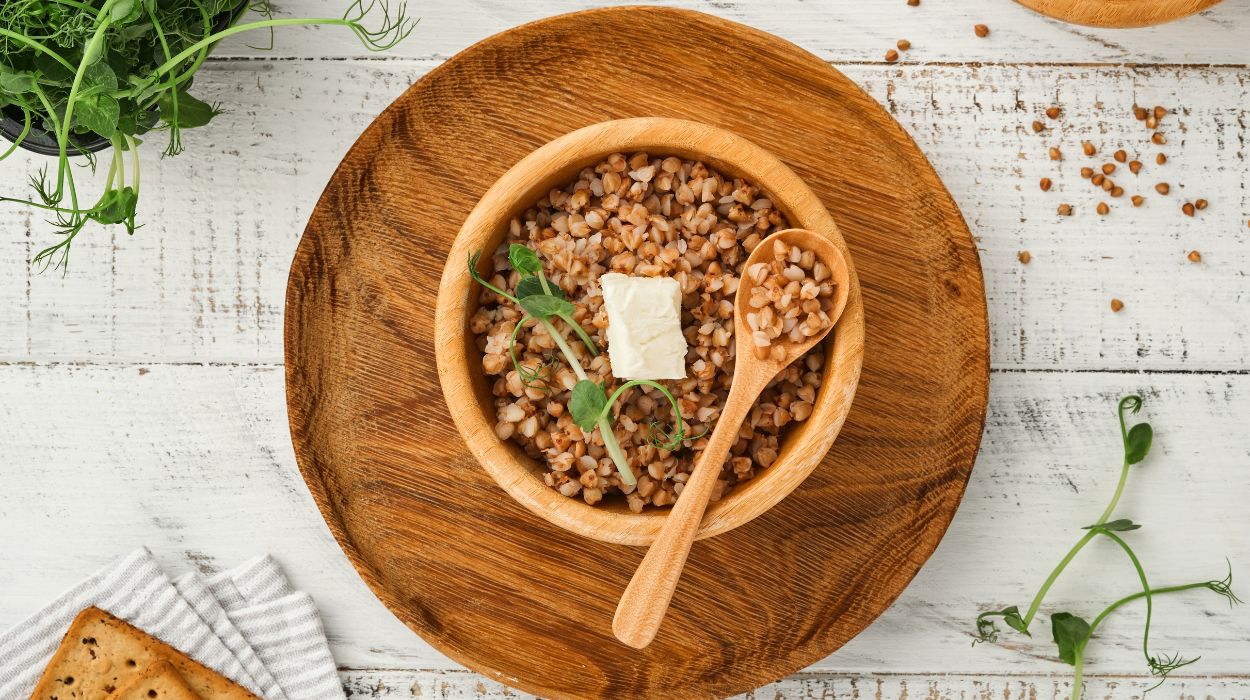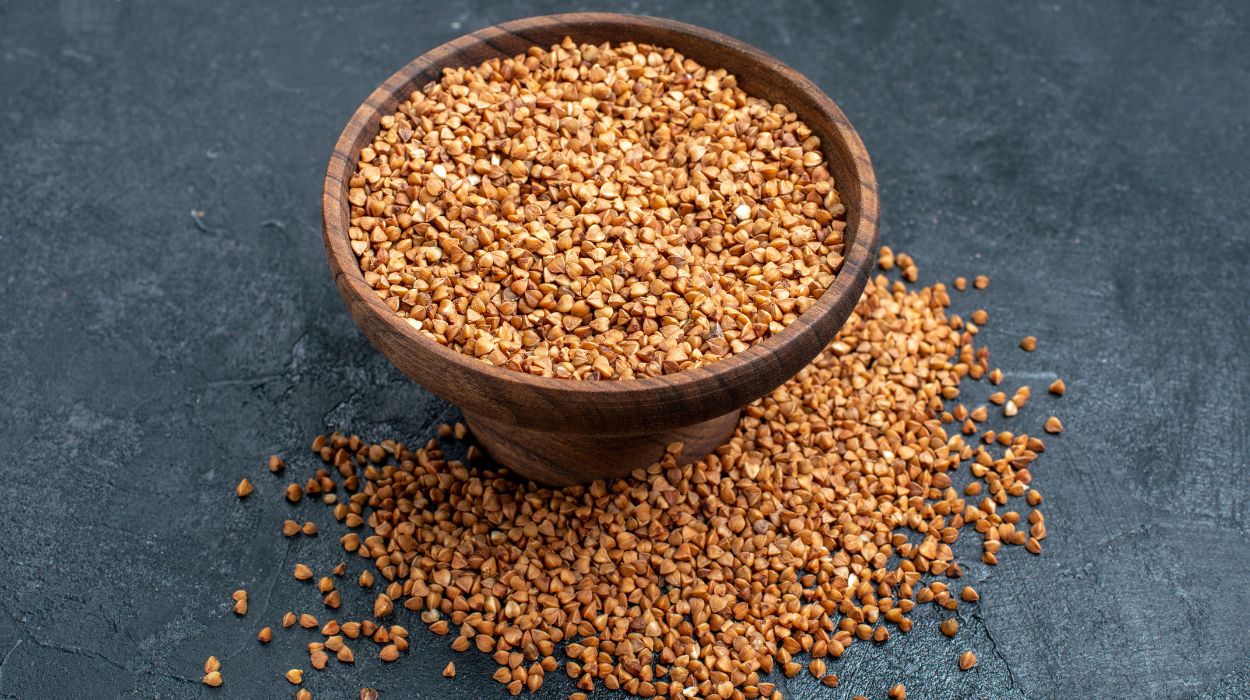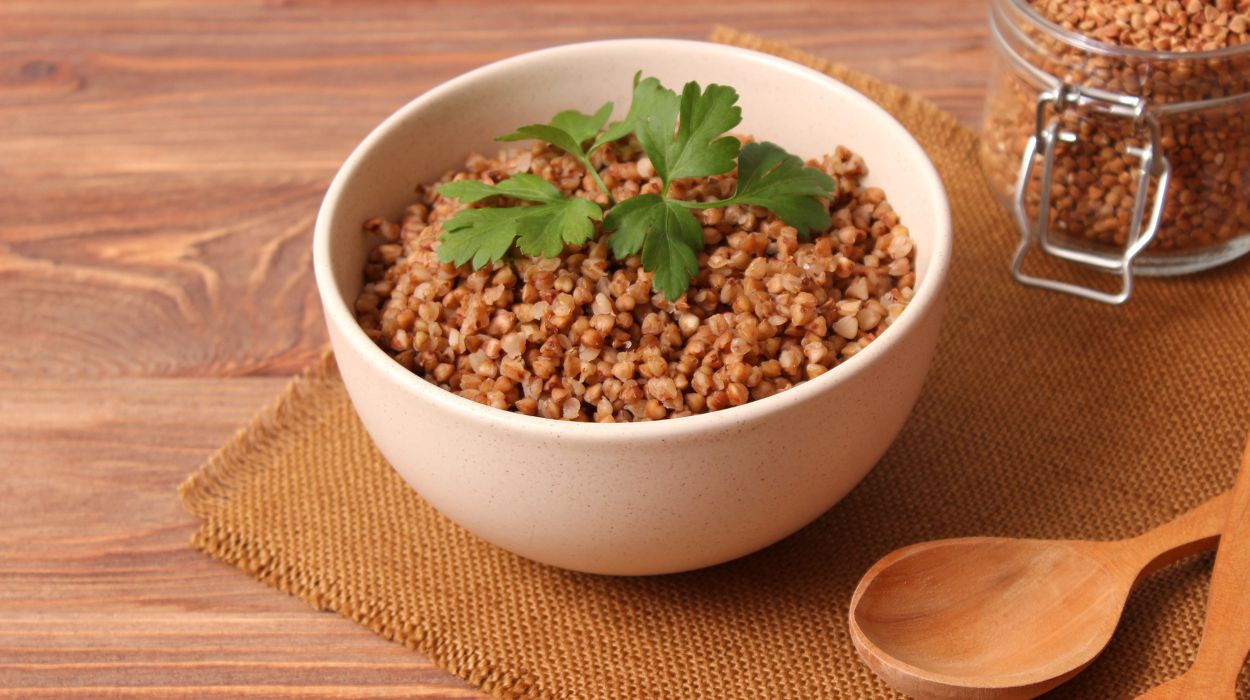 Evidence Based
Evidence Based
Evidence Based
This article is objectively based on relevant scientific literature, written by experienced medical writers, and fact-checked by a team of degreed medical experts.
Our team of registered dietitian nutritionists and licensed medical professionals seek to remain objective and unbiased while preserving the integrity of any scientific debate.
The articles contain evidence-based references from approved scientific sites. The numbers* in parentheses (*1,2,3) will take you to clickable links to our reputable sources.
Buckwheat Benefits: Nutrition, Risks & How To Eat 2024

How would you define a functional food? Is it low-calorie? Is it healthy for your cardiovascular system? Does it include high fiber or high vitamins and minerals? If your answer is yes to each question, then buckwheat is an entirely functional food for health, weight loss, and disease prevention. Let’s find out the science behind the health benefits of buckwheat.
5 Buckwheat Health Benefits
Buckwheat offers several health benefits due to its unique nutritional profile:
- Protect yourself from cardiovascular diseases
- Manage blood sugar and diabetes
- Reduce the risk of cancer
- Reduce the risk of neurodegenerative diseases
- Improve digestive health
Buckwheat Benefits

Buckwheat is one of the most common pseudocereals. Health benefits[1] for heart disease, high blood pressure, high blood cholesterol, cancer, inflammation, and high blood sugar are attributed to buckwheat consumption. It is also a prebiotic food due to its high fiber content. Prebiotics act as food for the good bacteria in our gut, fostering their growth and protective effects.
The antioxidant (especially rutin and quercetin) content of buckwheat makes it a superfood against many diseases.
Researchers showed a significant increase in total antioxidant capacity in the blood by adding buckwheat honey[2] to the diet or with buckwheat-enriched bread[3] consumption.
Protect Yourself From Cardiovascular Diseases
Cholesterol-Lowering Effects
Buckwheat is a healthy and functional product for cardiovascular diseases. A study with 3,542 people[4] showed that buckwheat consumption decreased total cholesterol, blood fat, and low-density lipoproteins or LDL (bad cholesterol). It also increased high-density lipoproteins, or HDL (good cholesterol), compared to the population who mainly consumed corn.
Total cholesterol and specific enzymes related to oxidative stress and inflammation were lower[5] in healthy volunteers who consumed cookies with buckwheat enrichment.
The study on human intestinal cells[6] showed that buckwheat extracts might reduce the intestinal absorption of dietary cholesterol in the bowels. Buckwheat (but not wheat and rice) may lead to greater cholesterol excretion[7] from the body and reduce some gene activation about cholesterol absorption and transfer of intestinal cells (NPC1L1 and ACAT2).
Vascular Health & Blood Pressure
According to the studies above, we know that buckwheat can reduce blood cholesterol levels. This mechanism[8] benefits vascular health and hypertension prevention because LDL cholesterol or oxidized-LDL by stress factors is the enemy of vascular health and forming artery-blocking plaques.
In another study,[9] researchers indicated that fermented buckwheat sprouts contain natural angiotensin-converting enzyme inhibitors or ACE inhibitors. ACE inhibitors are the targeted enzyme for many hypertension drugs because it has a role in the production of the angiotensin molecule, of which an excessive amount leads to a massive increase in blood volume and vascular tension by reducing the water loss from kidneys and contracting the vessels.
The relationship between buckwheat consumption and blood pressure regulation has yielded inconsistent results between the studies.[10] Some studies show a reduction in blood pressure, but there are also studies indicating no relationship between the two variables.
Manage Blood Sugar & Diabetes
Diabetes[11] is a chronic disease challenging about 422 million people worldwide. It occurs with insulin secretion deficiency or ineffective insulin activity, resulting in increased blood sugar levels. Buckwheat health benefits include glucose metabolism regulation, an essential function for patients with diabetes.
It is well-established[12] that whole grain foods have a lower glycemic index, a system that ranks foods based on their blood sugar effects on a scale of 1-100. Pure sugar has a glycemic index of 100.
Similarly, a diet rich in fiber benefits blood sugar control in patients with diabetes or people with blood sugar fluctuations or insulin resistance.
A low-glycemic index diet[13] is highly recommended for patients with diabetes or other unbalanced blood sugar problems, such as polycystic ovary syndrome. Those who use buckwheat rather than plain wheat daily can lower the glycemic index of their diet. Buckwheat has a glycemic index of approximately 50, which is considered low.
The study[14] with healthy individuals showed that blood glucose levels after meals were lower in volunteers who consumed buckwheat products, especially buckwheat groats.
Another study on 10 healthy, normal-weight volunteers showed a two-hour postprandial blood sugar that was significantly lower[15] on buckwheat bread than on other test bread, concluding that buckwheat would be an ideal food for preventing and treating people with diabetes.
Reduce The Risk Of Cancer
Cancer[16] is the disease of the century and the leading cause of death in developed or developing countries. Functional foods are gaining importance for the prevention of chronic diseases such as diabetes, metabolic syndrome, cardiovascular diseases, and also cancers.
There was an association between consuming several functional foods,[17] including buckwheat, and reduced risk of cancer since buckwheat can reduce oxidative DNA damage. This damage is the underlying mechanism of cancer initiation and development.
Reduce The Risk Of Neurodegenerative Diseases
The health benefits of buckwheat on neurodegenerative diseases are not yet clear, but promising results have been obtained in animal studies.[18] For this reason, the scientific world will elaborate on this relationship with human studies in the coming days.
In addition, it is suggested that the antioxidant component of buckwheat, called rutin,[19] reduces the risk of neurodegenerative diseases, including Alzheimer’s disease, Parkinson’s disease, or neurological function loss.
Improve Digestive Health
One of the reasons why buckwheat is consumed so widely is that it does not contain gluten. Today, gluten-free products[20] are frequently used in both celiac disease, gluten sensitivity, and general healthy nutrition.
In addition, buckwheat has an enormous contribution to digestive tract health. It supports[21] microbiota health and healthy defecation with its high level of dietary fiber.
What Is Buckwheat?
Cereals and whole grains have played a pivotal role in meeting the human population’s demand for starchy food since humans started to live in a communal setting. Cereals like corn, wheat, and rice constitute approximately 80% of the food consumption by human beings. These products are suitable for enrichment to meet the essential micronutrient needs for vitamins and minerals. However, researchers nowadays focus on other crops[22] like cereals.
These products are “pseudocereals[23]” because they are not cereals but also good carbohydrate sources. Luckily, “pseudocereals” are naturally rich in micronutrients and proteins compared to cereals. According to the Food and Agriculture Organization,[24] pseudocereals might help improve nutrition and health, meet food needs, and enhance livelihoods. Altogether, they contribute to future food security and a sustainable world. These underutilized crops have great potential to act for global hunger crises.
Nutrition Facts
Buckwheat nutrition data showed that it has the highest nutritional components[22] with the same calories per 100 grams as compared to rice, wheat, or corn(maize). You can see this in the table comparing buckwheat with rice, wheat, and corn. It has a good share of amino acids and total fiber. Furthermore, it contains higher calcium, iron, magnesium, manganese phosphorus, and potassium levels than other commonly used crops.
| Nutrients (per 100g grain) | Buckwheat | Rice | Wheat | Corn (Maize) |
| Energy (kcal) | 355 | 345 | 346 | 365 |
| Crude protein (%) | 12 | 6.8 | 11.8 | 9.4 |
| Total protein (g) | 13.2[25] | 6.61[26] | 10.3[27] | 3.87[28] |
| Total carbs (g) | 72.9 | 78.2 | 71.2 | 7.5 |
| Total fiber (%) | 17.8 | 4.5 | 12.5 | 7.5 |
| Fat (g) | 7.4 | 1.5 | 2.5 | 4.7 |
| Minerals (mg/per 100g grain) | ||||
| Calcium | 110 | 10 | 30 | 7 |
| Iron | 4 | 0.7 | 3.5 | 2.7 |
| Magnesium | 390 | 65 | 138 | 127 |
| Phosphorus | 330 | 160 | 298 | 210 |
| Manganese | 3.4 | 0.5 | 2.3 | 1.9 |
| Zinc | 0.8 | 1.3 | 2.3 | 1.9 |
| Potassium | 450 | 268 | 284 | 287 |
| Essential Amino Acids (% of total protein) | ||||
| Lysine | 5.9 | 3.8 | 2.6 | 1.9 |
| Methionine | 3.7 | 3 | 3.5 | 3.2 |
| Tryptophan | 1.4 | 1 | 1.2 | 0.6 |
| Leucine | 6.7 | 8.2 | 6.3 | 13 |
| Vitamins (mg/100 g grain) | ||||
| Tiamin | 3.3 | 0.06 | 0.5 | 0.4 |
| Riboflavin | 10.6 | 0.06 | 0.2 | 0.2 |
| Niacin | 18 | 1.9 | 5.5 | 3.6 |
| Tocopherol | 40 | – | – | – |
| Pentatonic Acid | 11 | – | – | – |
| Choline | 440 | – | – | – |
Table 1:[22] Nutrients in buckwheat, rice, wheat, and corn.
Buckwheat has a well-balanced composition[25] of amino acids, which leads to high biological activity. Buckwheat is particularly rich in lysine. This is an important content as plant-based protein sources include generally limited lysine. However, buckwheat has lower glutamine and proline amino acid levels than wheat.
Buckwheat might not be very suitable for lectin-free diet followers as it provides lectin-like other whole grain products. Lectin is a kind of carbohydrate-binding protein that may cause clumping (agglutination) of particular cells or precipitation of a bunch of molecules (glycoconjugates). You may prefer to control your lectin intake in your daily diet.
Buckwheat Side Effects
Is buckwheat good for you in every scenario? Unfortunately, no. Buckwheat is healthy food, but it becomes hazardous for one who has an allergy to buckwheat proteins.[29] It is one of the major allergen foods, especially in Asia, as it is commonly consumed in this area. It may even trigger potentially fatal anaphylaxis.
Buckwheat potentiates allergic reactions in some people because its proteins have strong resistance to enzymatic degradation in the digestive tract.
You should be aware of the body’s reaction when you eat food you didn’t eat before to realize if you are allergic to that food.
6 Ways To Eat Buckwheat

When you want to consume buckwheat, it is effortless to add to your diet, and there are many buckwheat recipes. Check out the examples below.
Salad
Buckwheat can be a low-calorie and healthy meal when making cereal salads. A grain salad that is gluten-free and enriched with vegetables and fruits is very nutritious and satisfying for your appetite.
Bread
You can use buckwheat flour to make bread or other bakery products. It is beneficial to make the carbohydrate sources you consume in your diet healthier. You can prefer buckwheat flour instead of white wheat flour to prepare even buckwheat pancakes or muffins.
Buckwheat Tea
You can prefer to drink rather than eat. It is possible to consume buckwheat as a herbal tea, which is frequent in Asia. Getting benefits from its flavonoids is a plus.
Meals
You can also consider cooked buckwheat groats with your meat or vegetable main dishes.
Snacks
Buckwheat crackers are a low-calorie, nutritious choice for snacks.
Raw Buckwheat Groats
You can try to consume raw buckwheat groats such as oatmeal with milk or yogurt. It could be more challenging to consume than in the cooked form, but it is also very beneficial.
The Bottom Line: Is Buckwheat Healthy?
The health benefits of buckwheat are apparent according to scientific studies. Increasing the phenolic content of the diet, vitamin and mineral intake, and increased dietary fiber by buckwheat consumption benefits many health problems such as cardiovascular diseases and diabetes, cancer, obesity, and neurodegenerative diseases.
It is a great advantage that it does not contain gluten. In this way, it creates an important carbohydrate source for both celiac patients and other people consuming gluten-free diets.
Thanks to the amino acid, vitamin, and mineral content of buckwheat, it has many health benefits as a high-quality carbohydrate source. However, it can cause allergic responses or side effects in buckwheat-sensitive individuals.
Once you are sure you are not allergic to buckwheat, you can add this healthy carbohydrate source to your diet in many different ways for a low-glycemic approach to including healthy fiber and nutrients into your balanced diet.
+ 29 sources
Health Canal avoids using tertiary references. We have strict sourcing guidelines and rely on peer-reviewed studies, academic researches from medical associations and institutions. To ensure the accuracy of articles in Health Canal, you can read more about the editorial process here
- WCRF International. (2022). Worldwide cancer data | World Cancer Research Fund International. [online] Available at: https://www.wcrf.org/cancer-trends/worldwide-cancer-data/
- Nele Gheldof, Xiao Hong Wang and Engeseth, N.J. (2003). Buckwheat Honey Increases Serum Antioxidant Capacity in Humans. Journal of Agricultural and Food Chemistry, [online] 51(5), pp.1500–1505. doi:https://doi.org/10.1021/jf025897t.
- T. Bojňanská, H. Frančáková, P. Chlebo and A. Vollmannová (2009). Rutin Content in Buckwheat Enriched Bread and Influence of its Consumption on Plasma Total Antioxidant Status. Czech Journal of Food Sciences, [online] 27(Special Issue 1), pp.S236–S240. doi:https://doi.org/10.17221/967-cjfs.
- Zhang, H.-W., Zhang, Y.-H., Lu, M.-J., Tong, W.-J. and Cao, G.-W. (2007). COMPARISON OF HYPERTENSION, DYSLIPIDAEMIA AND HYPERGLYCAEMIA BETWEEN BUCKWHEAT SEED‐CONSUMING AND NON‐CONSUMING MONGOLIAN‐CHINESE POPULATIONS IN INNER MONGOLIA, CHINA. Clinical and Experimental Pharmacology and Physiology, [online] 34(9), pp.838–844. doi:https://doi.org/10.1111/j.1440-1681.2007.04614.x.
- Gunilla Wieslander, Fabjan, N., Maja Vogrincic, Kreft, I., Janson, C., Spetz-Nyström, U., Blanka Vombergar, Christer Tagesson, Per Leanderson and Norbäck, D. (2011). Eating Buckwheat Cookies Is Associated with the Reduction in Serum Levels of Myeloperoxidase and Cholesterol: A Double Blind Crossover Study in Day-Care Centre Staffs. Tohoku Journal of Experimental Medicine, [online] 225(2), pp.123–130. doi:https://doi.org/10.1620/tjem.225.123.
- Metzger, B.T., Barnes, D.M. and Reed, J.D. (2007). Insoluble Fraction of Buckwheat (Fagopyrum esculentum Moench) Protein Possessing Cholesterol-Binding Properties That Reduce Micelle Cholesterol Solubility and Uptake by Caco-2 Cells. Journal of Agricultural and Food Chemistry, [online] 55(15), pp.6032–6038. doi:https://doi.org/10.1021/jf0709496.
- Yang, N., Yuk Man Li, Zhang, K., Jiao, R., Ka Ying Ma, Zhang, R., Ren, G. and Chen, Z.-Y. (2014). Hypocholesterolemic activity of buckwheat flour is mediated by increasing sterol excretion and down-regulation of intestinal NPC1L1 and ACAT2. Journal of Functional Foods, [online] 6, pp.311–318. doi:https://doi.org/10.1016/j.jff.2013.10.020.
- Lim, G.B. (2019). Reductions in LDL-cholesterol and blood-pressure levels have cumulative benefits. Nature Reviews Cardiology, [online] 16(11), pp.650–650. doi:https://doi.org/10.1038/s41569-019-0279-x.
- Koyama, M., Hattori, S., Amano, Y., Watanabe, M. and Nakamura, K. (2014). Blood Pressure-Lowering Peptides from Neo-Fermented Buckwheat Sprouts: A New Approach to Estimating ACE-Inhibitory Activity. PLOS ONE, [online] 9(9), pp.e105802–e105802. doi:https://doi.org/10.1371/journal.pone.0105802.
- Li, L., Lietz, G. and Seal, C. (2018). Buckwheat and CVD Risk Markers: A Systematic Review and Meta-Analysis. Nutrients, [online] 10(5), pp.619–619. doi:https://doi.org/10.3390/nu10050619.
- Li, L., Lietz, G. and Seal, C. (2018). Buckwheat and CVD Risk Markers: A Systematic Review and Meta-Analysis. Nutrients, [online] 10(5), pp.619–619. doi:https://doi.org/10.3390/nu10050619.
- Ajala, O., English, P. and Pinkney, J. (2013). Systematic review and meta-analysis of different dietary approaches to the management of type 2 diabetes. The American Journal of Clinical Nutrition, [online] 97(3), pp.505–516. doi:https://doi.org/10.3945/ajcn.112.042457.
- Ajala, O., English, P. and Pinkney, J. (2013). Systematic review and meta-analysis of different dietary approaches to the management of type 2 diabetes. The American Journal of Clinical Nutrition, [online] 97(3), pp.505–516. doi:https://doi.org/10.3945/ajcn.112.042457.
- Skrabanja, Liljeberg Elmståhl Hg, Kreft I and Im, B. (2000). Nutritional Properties of Starch in Buckwheat Products: Studies in Vitro and in Vivo. Journal of Agricultural and Food Chemistry, [online] 49(1), pp.490–496. doi:https://doi.org/10.1021/jf000779w.
- Su-Que, L., Meng Ya-Ning, Xing-Pu, L., Zhang Ye-Lun, Guang-Yao, S. and Hui-Juan, M. (2013). Effect of consumption of micronutrient enriched wheat steamed bread on postprandial plasma glucose in healthy and type 2 diabetic subjects. Nutrition Journal, [online] 12(1). doi:https://doi.org/10.1186/1475-2891-12-64.
- WCRF International. (2022). Worldwide cancer data | World Cancer Research Fund International. [online] Available at: https://www.wcrf.org/cancer-trends/worldwide-cancer-data/
- Zeng, Y., Du, J., Pu, X., Yang, J., Yang, T., Yang, S. and Yang, X. (2015). Coevolution between Cancer Activities and Food Structure of Human Being from Southwest China. BioMed Research International, [online] 2015, pp.1–10. doi:https://doi.org/10.1155/2015/497934.
- Yeon, C., Min, L., Gu, L., ChoSunghun, YoonYoung-Ho, Ju, C. and LeeSanghyun (2015). Then-Butanol Fraction and Rutin from Tartary Buckwheat Improve Cognition and Memory in anIn VivoModel of Amyloid-β-Induced Alzheimer’s Disease. Journal of Medicinal Food, [online] 18(6), pp.631–641. doi:https://doi.org/10.1089/jmf.2014.3292.
- Adaze Bijou Enogieru, Haylett, W., Donavon Charles Hiss, Bardien, S. and Okobi Eko Ekpo (2018). Rutin as a Potent Antioxidant: Implications for Neurodegenerative Disorders. Oxidative Medicine and Cellular Longevity, [online] 2018, pp.1–17. doi:https://doi.org/10.1155/2018/6241017.
- Rai, S., Kaur, A. and Chopra, C.S. (2018). Gluten-Free Products for Celiac Susceptible People. Frontiers in Nutrition, [online] 5. doi:https://doi.org/10.3389/fnut.2018.00116.
- Kreft, I., Germ, M., Golob, A., Blanka Vombergar, Bonafaccia, F. and Zlata Luthar (2022). Impact of Rutin and Other Phenolic Substances on the Digestibility of Buckwheat Grain Metabolites. International Journal of Molecular Sciences, [online] 23(7), pp.3923–3923. doi:https://doi.org/10.3390/ijms23073923.
- Tanveer Bilal Pirzadah and Malik, B. (2020). Pseudocereals as super foods of 21st century: Recent technological interventions. Journal of Agriculture and Food Research, [online] 2, pp.100052–100052. doi:https://doi.org/10.1016/j.jafr.2020.100052.
- Fletcher, R.J. (2016). Pseudocereals: Overview. Elsevier eBooks, [online] pp.274–279. doi:https://doi.org/10.1016/b978-0-12-394437-5.00039-5.
- Thematic Working Group on Agriculture, Food Security and Land Use. (n.d.). Available at: https://www.fao.org/3/cb2878en/cb2878en.pdf.
- ACS Publications. (2015). Buckwheat as a Functional Food and Its Effects on Health. [online] Available at: https://pubs.acs.org/doi/10.1021/acs.jafc.5b02498
- Usda.gov. (2024). FoodData Central. [online] Available at: https://fdc.nal.usda.gov/fdc-app.html#/food-details/169760/nutrients
- Usda.gov. (2024). FoodData Central. [online] Available at: https://fdc.nal.usda.gov/fdc-app.html#/food-details/169761/nutrients
- Usda.gov. (2024). FoodData Central. [online] Available at: https://fdc.nal.usda.gov/fdc-app.html#/food-details/169998/nutrients
- Norbäck, D. and Gunilla Wieslander (2021). A Review on Epidemiological and Clinical Studies on Buckwheat Allergy. Plants, [online] 10(3), pp.607–607. doi:https://doi.org/10.3390/plants10030607.



